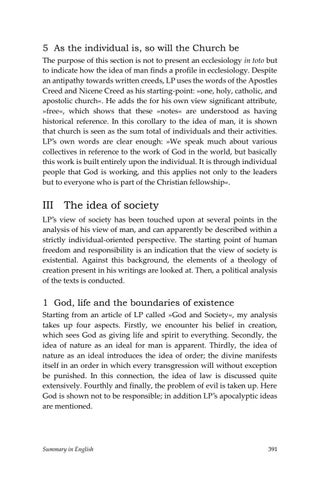5 As the individual is, so will the Church be The purpose of this section is not to present an ecclesiology in toto but to indicate how the idea of man finds a profile in ecclesiology. Despite an antipathy towards written creeds, LP uses the words of the Apostles Creed and Nicene Creed as his starting-point: »one, holy, catholic, and apostolic church«. He adds the for his own view significant attribute, »free«, which shows that these »notes« are understood as having historical reference. In this corollary to the idea of man, it is shown that church is seen as the sum total of individuals and their activities. LP’s own words are clear enough: »We speak much about various collectives in reference to the work of God in the world, but basically this work is built entirely upon the individual. It is through individual people that God is working, and this applies not only to the leaders but to everyone who is part of the Christian fellowship«.
III The idea of society LP’s view of society has been touched upon at several points in the analysis of his view of man, and can apparently be described within a strictly individual-oriented perspective. The starting point of human freedom and responsibility is an indication that the view of society is existential. Against this background, the elements of a theology of creation present in his writings are looked at. Then, a political analysis of the texts is conducted.
1 God, life and the boundaries of existence Starting from an article of LP called »God and Society«, my analysis takes up four aspects. Firstly, we encounter his belief in creation, which sees God as giving life and spirit to everything. Secondly, the idea of nature as an ideal for man is apparent. Thirdly, the idea of nature as an ideal introduces the idea of order; the divine manifests itself in an order in which every transgression will without exception be punished. In this connection, the idea of law is discussed quite extensively. Fourthly and finally, the problem of evil is taken up. Here God is shown not to be responsible; in addition LP’s apocalyptic ideas are mentioned.
Summary in English
391

